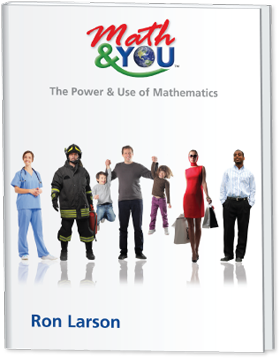What is Quantitative Literacy?
As the world around us changes and information comes at warp speed, it is more important than ever for students to be able to be quantitatively literate. The Math & YOU program is a research based program written to address these needs. It’s a program that develops the quantitative skills needed to be successful in life, work and school. The book uses real life data, problems, and activities that are real and relevant.
One of the goals of the Math & YOU program is to help students become comfortable with quantitative ideas and proficient in applying them. Math & YOU provides examples and exercises that help students to understand the nature of mathematics and its importance for comprehending issues in the public realm.
The Math & YOU program develops habits of inquiry, prepares students to look for appropriate information, and exposes them to arguments so that they can analyze and reason to get at the real issues. One of the goals of the text is for students to see that mathematics is a powerful tool for living.
Download the Quantitative Literacy: Course Description and Standards (PDF) 
| Mathematics | Quantitative Reasoning | Math & YOU |
|---|---|---|
| Approximation | Estimation is critical | pg. 18, #1-6 |
| Well-defined problems | Ill-defined problems | pg. 56, Checkpoint |
| Heavily disciplinary | Interdisciplinary | pg. 133, #23-30 |
| Power in generality | Specific, particular applications | pg. 162, Ex. 1 |
| Society independent | Society dependent | pg. 164, Checkpoint |
| Some context dependency | Heavy context dependency | pg. 202, Ex. 1 |
| Apolitical | Political | pg. 217, Ex. 6 |
| Power in abstraction | Real, authentic contexts | pg. 269, #7-12 |
| Problem situations | Problem descriptions | pg. 279, Ex. 6 |
| Predictable | Unpredictable | pg. 378, Ex. 5 |
| Few opportunities to practice outside the classroom | Many opportunities tp practice outside the classroom | pg. 423, #1-4 |
| Methods and algorithms | Ad hoc methods | pg. 462, Ex. 1 |
Taken from the MAA Journal, Reflections of Quantitative Reasoning: an Assessment Perspective





